#Consulate era
Text

Referred to as the ‘Côtes de Melon’, after the distinctive pommel shaped like the ‘ribs of the melon’. This sabre style gained popularity among French officers from about 1800 and remained in use until the introduction of the model 1821 infantry and 1822 cavalry sabres during the Restoration era.

Aside from the pommel, the type is distinguished by the simple stirrup hilt with langets and a single quillion. The grips are made from hardwood and can be checkered or have longitudinal groves. Often the knuckle guard has a stylised olive decorative feature. Swords belonging to superior officers would have been silver-plated.



The swords of mounted or cavalry officers can be identified by their length and dual suspension rings on the scabbard. Superior officers typically had ornate metal scabbards, while infantry officers preferred shorter sabres with a frog stud for use with the cross-belt.
An officer of one of the light cavalry regiments most likely owned this sabre. The blade is particularly large and sturdy, plus the scabbard has dual suspension rings. The blade is decorated in the typical oriental fashion of the late 18th Century with faux Islamic / cabalistic script and an ‘Ottoman’s head’. There is a lovely Solingen rose on the blade's spine but no other identifying manufacturer's marks.



The simple ‘baguette’ shaped langets, blade decorations and plain knuckle guard may indicate that this is an early example of the type, or that it was used by an officer of another nation, imitating French fashion.

Overall Length: 965 mm
Blade Length: 825 mm
Grip Length: 130 mm
Inside Grip Length: 110 mm
Sword Weight: 800 grams
Total Weight: 1050 grams
Point of Balance: 180 mm
Curve: 37 mm
#Sword#Sabre#côtes de melon#French#French Army#French Cavalry#Napoleonic Wars#Consulate era#First Empire#Antiques#Military Antiques#Cavalry Swords#Light Cavalry
83 notes
·
View notes
Text



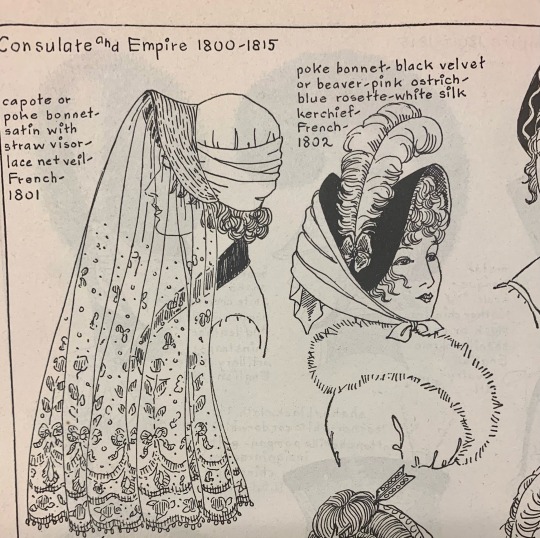

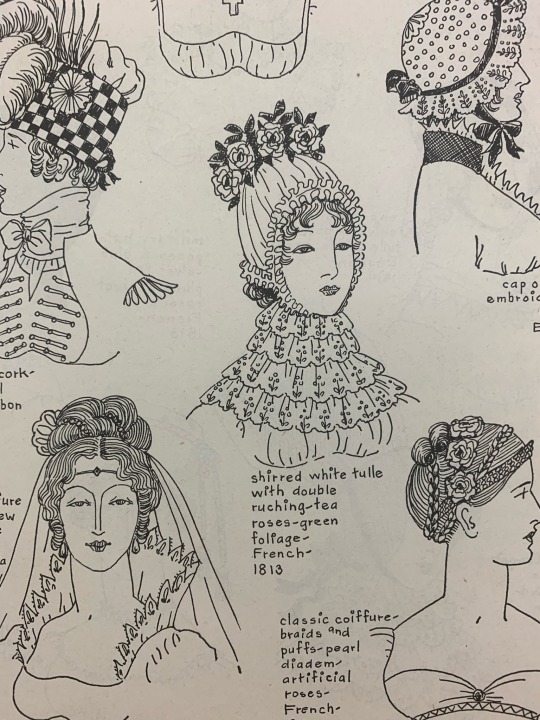


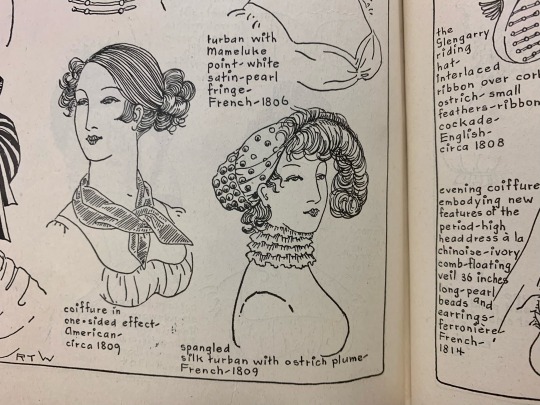
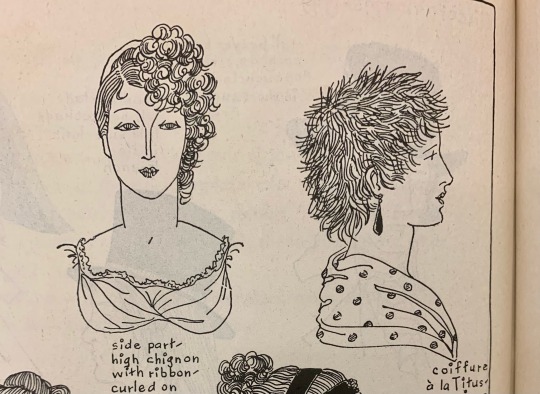
Found a really awesome old book containing pictures of women’s hairstyles and headdresses from the Consulate and Empire, early 19th century
Source: The Mode in Hats and Headdress by R. Turner Wilcox, published 1945
#Napoleonic era#empire#empire style#consulate and empire#19th century#consulate#first french empire#French empire#napoleonic#premier empire#French#France#hair#hairstyle#headdress#headdresses#hairstyles#fashion#history of fashion#fahsion history#history#style#pretty#French fashion#book#vintage#vintage fashion#vintage book#antique#hats
224 notes
·
View notes
Text
youtube
Watch the American Climate Leadership Awards 2024 now: https://youtu.be/bWiW4Rp8vF0?feature=shared
The American Climate Leadership Awards 2024 broadcast recording is now available on ecoAmerica's YouTube channel for viewers to be inspired by active climate leaders. Watch to find out which finalist received the $50,000 grand prize! Hosted by Vanessa Hauc and featuring Bill McKibben and Katharine Hayhoe!
#ACLA24#ACLA24Leaders#youtube#youtube video#climate leaders#climate solutions#climate action#climate and environment#climate#climate change#climate and health#climate blog#climate justice#climate news#weather and climate#environmental news#environment#environmental awareness#environment and health#environmental#environmental issues#environmental justice#environment protection#environmental health#Youtube
16K notes
·
View notes
Text
Apologies and Giggles (SMUT) /concept/
AN: just another scene that kept playing in my head so i wrote it out. it's a little silly piece with a loving touch. enjoy.
This story contains: sex, giggles, apologies, mentions of ass play, kinda angsty?, harry being as sweet as ever
{ boyfriend!harry - softrry - current harry era }
word count- 389
During sex you accidently touch Harry's bum hole to which Harry finds hillarious but you get embarrassed and apologize.

"Baby, if you wanted to play with my ass you could have just told me." Harry says through giggles with his face in your warm neck.
See, you'd had your hands gripped on both sides of Harry's butt cheeks as he thrusted into you. But from his aggressive movements your fingers slipped between his crack and accidently touched his tight hole. After the initial shock of the touch, Harry fell forward and couldn't stop laughing.
"Har, I..... I'm so sorry. I didn't mean too, my hand just slipped." you try to apologize.
Hearing that you're not on the same page in this situation, Harry finishes his last giggle before sitting up, still inside you might I add.
"Y/N, love, why are you apologizing for? You've literally ate my ass before. You know I'm all for a little bum play." Harry says to consul your worried mind. He honestly didn't care one bit, even if it was only an accident.
Looking up to make the first eye contact since the accident occured, you rebuttal, "Yeah but it startled you. Like I should have asked to touch you there first and I didn't."
Harry leans back down so you're chest to chest again and speaks softly in your right ear, "Baby, we-are-havin' sex. We know each other's limits and do's and don'ts. As far as I know, I've never gave you a rule to not touch certain parts of me. I'm all yours. Whatever you wanna do or touch, I'm here for it. You don't have to ask. Just do what you know would make me feel good and I'll do the same to you, alright. And it only startled me because I just wasn't expecting it, didn't mean I didn't like it."
Very quietly, you mutter, "Okay, thank you for being so kind. Now can you start moving again because before I accidently touched your ass hole you were about to make me come."
Giggling again, Harry answers, "Yeah, want me to keep fuckin' you baby? Make you come?" You only nod your head and he continues, "Course I'll make you come, m'love. But like, can you do that thing with your fingers where you reach behind me and like, touch my bum hole." Now he's only mocking the incident.
You catch on to the giggles and gasp, "Harry!"
(PLEASE REBLOG BECAUSE WRITING IS NOT EASY AND IT'S FREE SO JUST DO IT)
(no more tags are allowed because i've hit my number limit. sorry : ( )
tag list: @one-sweet-gubler // @harryscherrysugar // @hsfanficsrecss // @lollypopsx // @harrycanyonmoonn // @itfeelslikemytherapisthatesme // @damnasstyles // @mrsstylesharry // @softmullet // @meetmyblondemuffins // @thegirlnextdoorssister // @stanleystyles // @haarrrys // @michellekstyles // @skyangel57 // @the-gardener-31 // @lhharrylilpumpkin // @yousunshine-youtemptress // @clairestylessss // @kissmyaxe140 // @goldenmelonsugar-hi // @kaitieskidmore97 // @florencepughily // @alienorknight //@dancearoundthelivingroom // @swiftmendeshoran
// @luv-flor7777 // @alohastyles-x // @tenaciousperfectionunknown // @sleutherclaw // @siredtohybrid // @whoscamila // @a-strange-familiar // @golden-elodie // @mrspeacem1nusone // @goldenkhae // @lntwithhrry // @shadowygladiatorlight // @manifestrry //@mendesblurb // @sunshinemoonsposts // @depersonalizationsucks // @academiaghost // @zendayassimp // @reveriehs // @vsnnstuff // @dancinsunflowerkiwi // @quinnsgrapejuice // @walkingintheheartbreaksatellite // @justlemmeholdyou // @hsonlyangelxo // @luvonstyles // @howdey
______________
My Masterlist Masterpost
#harry styles#harry styles fan fiction#harry styles fic rec#boyfriendrry#boyfriend!harry#softrry#soft!harry#harry styles smut#harry styles smutty#harry styles fluff#harry styles angst#harry x reader#smut#fluff#angst#harry styles comfort#harry styles concept#harry styles blurb
453 notes
·
View notes
Text

Osaka, 1601
nedpan is one of those ships where i feel like it might've started with horniness and curiosity, before catching feelings that run pretty deep. because when they first meet in 1600, it's a pretty tumultuous era: imo, they're both somewhat sharp and jaded old world nations, who were recently or still at war with their neighbours. so, they're cautious about trust and emotional vulnerability; i reckon they initially view their rship as a transient fling—a dutch ship (De Liefde) is shipwrecked on japanese shores and stuck far from home for a while so well, why not indulge a little? but...that first meeting ends up starting something that grows into an enduring relationship. (also cherry blossoms!—because of that 17th century poem by matsuo basho that goes "the dutchmen too have / come to see the cherry blossoms / saddle my horse"—about the dutch consul's regular springtime audience with the shogun.)
249 notes
·
View notes
Text
Commodus: The end of an Era. "The reign of Commodus marked the end of the Golden Age and the beginning of the Age of Rusty Iron." Cassius Dio

Lucius Aelius Aurelius Commodus was born on August 31, 161. Curiously, he was born on the same day and month as 'Caligula', the first assassinated Roman emperor. He was the first who been born being the son of the reigning emperor, Marcus Aurelius.


M. Aurelius and Verus ruled together in perfect cooperation for eight years. Verus fought against the Parthians who had threatening to take Syria and Armenia. Returned to Rome and had his triumphal parade without knowing that he and his legions were carrying a virus that arose in the war zone. The plague spread throughout the empire and was the deadliest in Roman history. In 169 Lucius Verus died due this plague.
The boy Commodus
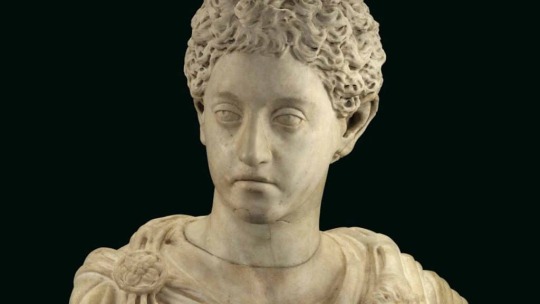
In 172, at age of 11, he received, in the presence of the army in Germania, the title Germanicus (a victory tittle). He participated alongside his father in several battles.
175. His mother, Empress Faustina the Younger, died of natural causes in Cappadocia where she accompanied her husband. On the same year Commodus entered the College of Pontiffs, which was the starting point of his public career.
176. Marcus Aurelius granted him the position of Imperator, and the following year the title Augustus.
In January of 177, at the age of 15 , he became the youngest consul in the history of the Empire.
178. At age of 16 married to Bruttia Crispina, a very rich 13 year old girl from a family close to the imperial Domus since the time of emperor Hadrian.
March 17, 180, Marcus Aurelius died of natural causes and Commodus became sole emperor at the age of 18.
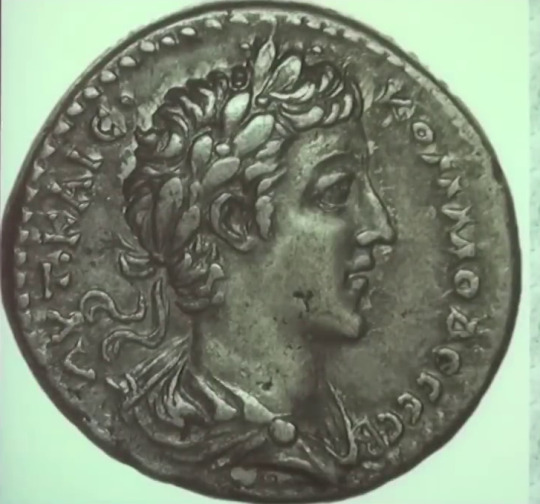
His first measure was to sign peace treaties both with Germanic tribes and some rebellious people of Britannia. This was frowned upon by his contemporaries, but modern historians agree that it was the only good action he ever took during his entire reign.
About his sister.

Lucilla had been co-empress and held the title Augusta along with her mother when she married the co-emperor Lucius Verus. Following Verus' death, Marcus Aurelius married her to senator Tiberius Pompeianus, a man of humble origins and without ambitions. In this way she lost the privileged position that she had.
In the winter of 181-182 Lucilla with her cousins Quadratus Annianus and Ummidia Faustina, her husband's nephew, Quintianus, and her own daughter Plautia, agreed to assassinate Commodus in the exit hallway of Flavian amphitheater (Colosseum) .The one chosen to kill was Quintianus. Incredibly, although proven, Pompeianus was completely unaware of the plot of his wife.

According to historical sources, when Quintiano saw Commodus, instead of stabbing him, slowly took out his dagger, showed it to him and said "The Senate send to you this dagger." Commodus shouted for his guard who immediately arrested him. The names of the involved were quickly known; Quintianus and Quadrato were executed. Lucilla, her daughter, and U. Faustina were sent into exile on Capri but and also executed there.
Following this event, he distanced himself from the elite and began to trust only in people of humble origins, among them Marcus Aurelius Cleander, former slave and freedman of Marcus Aurelius. In a short time he held important positions until he became the head of the Praetorian Guard.
In 187 due his wife's failure to become pregnant, banished her to Capri. 26-year-old Commodus, instead of marrying another aristocratic woman, chooses to have a concubine- Marcia, daughter of a freedwoman of co-emperor Lucius Verus.

The emperor treated her as a wife, so she had the same power and influence as an empress. It is very probable that Marcia was a Christian since she convinced Commodus to implement a pro-Christian policy, and had a close relationship with Victor I , Bishop of Rome.
Villa of the Quintilii and the rebellion of the people.

Commodus and Marcia retired to the lavish Villa of the Quintilii, whose ruins are today an archaeological site. On April of 190 the people had revolted in Rome because of famine.
There is a suspicion that the shortage of food may have been caused by the prefect of Annona (the import and free distribution of grain to the people) Papirius Dionysius who blamed Cleander.
During a horse-race in the Circus Maximus, the audience to rioted against Cleander. He escaped and managed to reach the Villa of the Quintilii to ask the emperor for help, but the mob followed him there. Commodus, fearing the fury of the people, ordered Cleander to be beheaded. He then also ordered the execution of the prefect of Annona Papirius Dionysius.

By then Commodus was already showing signs of an extreme megalomania and paranoia. The list of people executed, accused without evidence of conspiracy, including his own aunt, consuls, senators and praetorians, is endless. Those conspiracies were only in his mind.
He gave himself the title PIUS, title that the Senate had granted to his maternal grandfather the Emperor Antoninus, and ordered sculptures and busts of himself to be made representing him as Hercules.
Madness and death
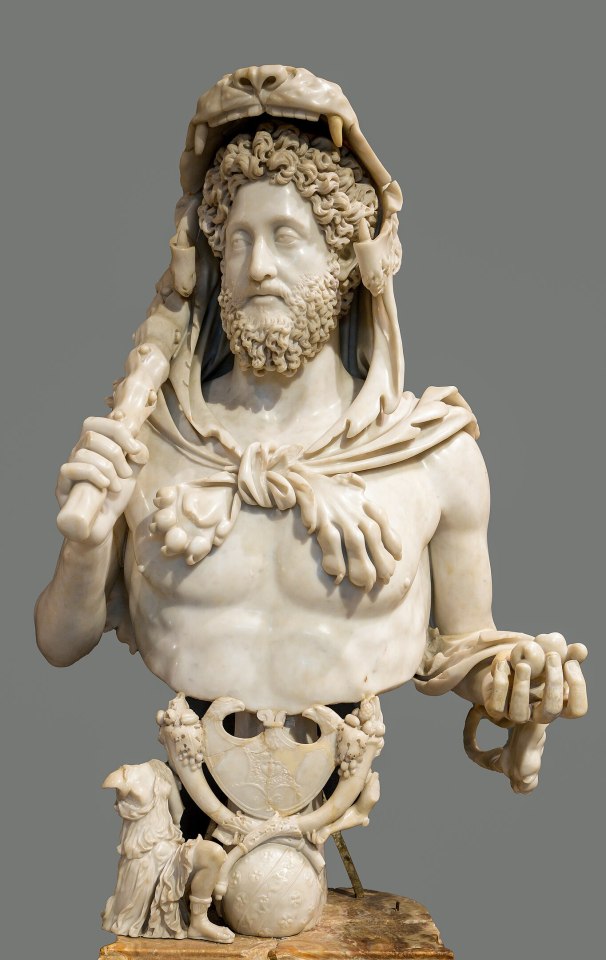

In 192 changed the name of Rome to "Comodiana" and announced that a new era was approaching, he called it Saeculum Felix (Happy Century). The months also was renamed with Commodus own names and titles as well of his dynasty. Thus, the year would begin with the month Imperator followed by Caesar, Augustus, Commodus, Germanicus, Pius, Lucius, Aelius, Aurelius, etc, not even the mystical month of July was saved from this folly.
According to historical sources, he had shaved his beard, which had been in fashion since his grandfather's time, and also changed his thick curly hair for Gladiator curt hair style. Had his own games in which he fought with gladiators, who were forced to consume opium and drink wine excessively to ensure the victory of Commodus.
On December he announced that starting in the new year everything would change in Rome since the Senate wold be dismissed. Senators along with Marcia, who had had enough of Commodus, began to plan his death.
During the feast of December 31 Marcia put poison in his food, but Commodus had drunk too much and vomited immediately, so he ended the party and ordered that his bath be prepared.
Senators made Plan B; They sent a freedman named Narcissus, who "because of his size and strength he did not need to hide daggers or swords, his hands were enough." Narcissus found Commodus in the bathtub, and strangled him. Other sources say he drowned him in the bathtub. Be that as it may, 31 years old Commodus never saw his long-awaited new year.

On January 1, 193, Praetorian Guard auctioned the throne to the highest bidder; The final price was stipulated at 25,000 sesterces per soldier. Pertinax bought the position of emperor but on March he was also murdered. Then Didius Julianus ruled for a few days. Finally, that same year, the winner of the civil war Septimius Severus became the first emperor originally from the province of Africa. Born in Leptis Magna (in modern Libya) was of Berber and Punic origin, and with his wife Julia Domna, a young noblewoman born in Syria and Arab origin, they created the Severan Dynasty.
Commodus was not wrong when he said that from that year on everything would change in Rome.

Emperor Septimius Severus ( 193-211 )
57 notes
·
View notes
Note
How was voting done in ancient rome?
Anon...you sent me down a whole rabbit-hole...and I'm still not quite sure I understand it all. But here's how I think it worked, and I welcome any corrections from folks who know more.
Rome's voting system changed a lot over the years. We have the most information about the late republic, so let's focus on that:

(I've left out the Curiate Assembly, which was mostly irrelevant at this point, and some other fiddly bits.)
Tribes and Centuries
If you were a Roman voter, you would be part of both a tribe and a century. Your tribe roughly meant which "region" your vote was associated with, though by the late republic people had moved around so much that didn't really mean anything. Your century was assigned by censors based on your wealth status. Only male citizens could vote, not women, slaves or non-Roman residents.
When you voted, the majority of your tribe or century's votes would all be counted as one vote in the election. If 60% of your tribe voted for Lucius Tiddlypuss, but you were one of the 40% who voted for Gnaeus Nautilus, tough shit. Tiddlypuss gets one vote counted and Nautilus gets nada.
To make things worse, not all tribes or centuries were equally powerful. The wealthiest centuries (equestrians and "first class enlisted") were much smaller than the poor and working-class centuries, so rich people's individual votes counted for more. And they got to vote first, and the election was over as soon as a candidate reached a majority of total votes, so poor centuries often didn't get to vote at all.
The tribal voting system was a little more fair. Its voting order was randomized. But since all elections took place in Rome, the rural voters who could make it were usually small in number - and rich enough to travel. So rural tribes were disproportionately powerful. Plus, the tribes were of different sizes again, so (for instance) freedmen's votes could be "diluted" by concentrating them in a few big urban tribes. Still, the tribal system was seen as more representative of the lower classes in practice.
On the upside, by this era, elections and plebiscites had written ballots that you could cast secretly. This reduced the power of patrons over their clients, and masters over freedmen.
Voting for People
To elect higher magistrates, like consuls, censors and praetors, you have to gather with your century in the Centuriate Assembly outside the city walls. Why? Because the Centuriate Assembly is technically based on soldier ranks, classed by how much gear each soldier could afford, and you can't be within Rome's city limit while in military formation. The tops "enlisted"-level centuries vote first, each century's vote counts for 1, then the equestrians vote in their groups, and so on until a candidate reaches over 50% of the total possible votes.
(Note: Cicero refers to 193 centuries, so most scholars believe that was the number in his lifetime. But not everyone agrees, and the Centuriate Assembly seems to have been reorganized a few times.)
Now let's vote for lower offices, like curule aediles, quaestors and military tribunes. The pontifices are also elected here. You can go back inside Rome's walls now, because the Tribal Assembly sorts voters into tribes, not military ranks. The order in which the tribes vote is randomized (in theory). If you're voting for a pontifex, only 17 random tribes out of 35 get to vote. Or, if you're living between 81 and 63 BCE, you don't get to vote for pontifices at all. Blame Sulla for that.
Finally, we'll vote in the tribunes of the plebs and plebeian aediles. If you're one of the 90%+ of Romans who are plebeian, you'll vote in the Plebeian Council, which works just like the Tribal Assembly except that there's a big "No patricians allowed!!" sign. Only plebs can vote, and only plebs can run for these offices!
Or at least, that's how most historians think it worked. It's not actually clear if the Plebeian Council was another name for the Tribal Assembly, a separate entity, or merged into it at some point. So whenever I say "Plebeian Council," put a mental asterisk after it.
Once someone is elected as a quaestor, tribune of the plebs, or a higher rank, he stays in the Senate for life unless the censors kick him out or a trial strips him of office. This year's consuls and praetors will become next year's proconsuls and propraetors, who govern provinces and sometimes take on other special assignments. Pontifices also hold their priesthoods for life, and can take on other jobs, too.
Voting for Laws
We've elected our dudes! Can you go home? Nope! Rome also has a lot of plebiscites, or referendums.
Most laws came from the Senate. The Senate voted on a bill, usually proposed by a consul, and if a majority of Senators approved the bill would go to the Plebeian Council. Most of the time, the Plebeian Assembly approved the bill, and it became law. But sometimes it refused, and the bill would either die, or have to be revised in the Senate before the Council would vote on it again.
Occasionally a tribune of the plebs would propose a bill directly to the Plebeian Council, without getting Senate approval first. Or, more rarely, a higher magistrate might. This was a great way to piss off the Senate! However, if the bill passed, the Senate had to abide by it anyway.
Changes to the System
Even just in the 54-year period I chose, the rules shifted sometimes. The biggest change was Sulla's constitutional reform, in which:
Tribunes of the plebs could no longer propose legislation or hold higher offices.
Thus, nearly all legislation came from the Senate instead of the Plebeian Council.
Pontifices were chosen by other pontifices, no longer elected.
The number of magistracies and overall size of the Senate was expanded.
Holding a magistracy of quaestor-level or higher automatically enrolled its holder in the Senate; before, that had to be ratified by the censors.
And more details, not related to elections and plebiscites, that I won't go into here.
Some of these changes were rolled back after Sulla's death. Tribunes were restored to their full powers by 70 BCE, and pontifices became publicly elected again from 63 onward.
Rome's last fully "free" elections took place in 50 BCE. After that, Caesar's civil war and dictatorship, his habit of appointing his supporters to government offices, and even more civil wars all fouled everything up. Augustus restored regular elections, but didn't step down, so they became little more than a popularity contest with no real power.
If you rewind back in time, you'll see other changes, too. Before 104 BCE, pontifices were chosen by other pontifices, just like Sulla preferred. Before 219, the Plebeian Council needed the Senate to ratify its laws, and before 287, its laws only applied to plebs. If you go way back to the 5th century, the Curiate Assembly I left out starts being relevant. There was a gradual shift toward the Plebeian Council gaining more power over time, and patrician-only offices gradually being opened to plebeians.
Once again, I'm not a historian, so please let me know if I got something wrong. Thank y'all for reading this long-ass post!
#i mainly wrote this up because i couldn't find any diagrams of the system that made sense to me#hopefully this will help other folks feel less confused than i was#roman voting#jlrrt essays#roman elections#also i voted in my party primary yesterday! if you're a US american be sure to look up when voting starts for you! <3
36 notes
·
View notes
Text
youtube
Watch the 2024 American Climate Leadership Awards for High School Students now: https://youtu.be/5C-bb9PoRLc
The recording is now available on ecoAmerica's YouTube channel for viewers to be inspired by student climate leaders! Join Aishah-Nyeta Brown & Jerome Foster II and be inspired by student climate leaders as we recognize the High School Student finalists. Watch now to find out which student received the $25,000 grand prize and top recognition!
#ACLA24#ACLA24HighSchoolStudents#youtube#youtube video#climate leaders#climate solutions#climate action#climate and environment#climate#climate change#climate and health#climate blog#climate justice#climate news#weather and climate#environmental news#environment#environmental awareness#environment and health#environmental#environmental issues#environmental education#environmental justice#environmental protection#environmental health#high school students#high school#youth#youth of america#school
16K notes
·
View notes
Text
Another post pointed out yesterday that the Clave was so progressive in the 1800s and (especially) 1900s while being incredibly regressive in the 2000s-2010s. This is inarguably true. It also inarguably is true to real life when it comes to views on homosexuality. While male homosexuality was illegal in the UK during the Victorian/Edwardian eras, many (though not all) people tended to turn a blind eye to it assuming that everyone involved minded their business. (Oscar Wilde, for a relevant example, was pretty widely known as being a man who loved other men. He probably would have been able to carry on as he was if not for suing a powerful and influential public figure. But I digress).
Also, it's important to note that, yeah, the TLH kids' parents were overall loving and accepting people. The one who was not such a person blessedly died before his son came out. On the other hand, Alec's parents were in a literal hate cult. But once again, digression.
Because what I really want to talk about are Shadowhunter's shifting attitudes to technology and innovation. I would like to posit that Christopher Lightwood's death was the beginning of the downfall of innovation in Shadowhunter society.
In TID, Henry contends with mockery and side glances because of his drive to invent and create. This makes sense in what his son will later describe as an "arid warrior culture." However, while generally labeled as an eccentric, the Clave - including the Consul and Inquisitor - generally leave him alone to tinker and build. No one stops him. And when he finally invents the Portal, no one shirks it. By the time TLH rolls around, it's a widely-used, widely-respected part of Shadowhunter society. It's ingrained in the fabric of their people just as steles and seraph blades are, and we still see them widely in use in the modern day.
Now, we get to Christopher, Henry's protigee.
It's important to acknowledge that Christopher may have been left alone in part because Henry's Portal was so successful. With him primarily hanging about in the Fairchild lab, nothing could go wrong. Additionally, Charlotte was Consul, and she knew how brilliant her husband was. This probably contributed to Christopher's success greatly.
Christopher grows up shrouded in this love. He is free to create and innovate as he pleases, and he comes up with the idea for fire-messaging. We see him successfully invent fire-messages by early 1904, at which point he is tragically killed by Belial.
Fire-messages are the final piece of technology that we see invented before the TMI era. All other technologies in the modern TSC canon exist in the historical stories. Thus, we can conclude that Christopher's fire-messages are one of the last creations of Shadowhunter society.
(ADHD side ramble: I'm interested to see what Grace manages to accomplish, but I cannot think of something in the modern TMIverse that she may have created. I imagine that her status as not only a woman but a widely-disliked social pariah held her back. Hate it, but my point stands. I hope she's at least given a small amount of credit for the final touches on the fire-messages.)
Anyway, fast forward to 2012. The TSCverse now has another brilliant neurodivergent mind in Tiberius Nero Blackthorn. Of course, he is extremely different from Henry and Christopher. He is more mentally present, serious-minded, and a lot less spacey. But he also views things in a significantly different way than other Shadowhunters do, finding himself drawn to technology like computers in a way that most Nephilim would shirk.
Ty and his family are forced to keep the fact that they have computers in the Institute a secret. This is likely in part because mundanes invented them, but it also feels inconsistent with previous generations. Shadowhunters of old appreciated art; Jem and Alastair were openly musicians, for example. Matthew is an obvious aesthete with a penchant for the theatre and artistic pursuits. Even when Alastair notes that they aren't supposed to like mundane things like moving pictures, he does not seem worried about facing repercussions for seeing one. Ty and the other Blackthorns seem to think that they will see legal ramifications for having a computer, and this is in a world where Jia Penhallow is Consul.
Could the Blackthorns be wrong? Sure. But it feels to me that the Shadowhunters of old would not shirk a useful technology, and the computer has limitless capacity to assist them in their demon-fighting endeavors.
The Clave closed itself off to progress shortly after TLH, and Christopher's death feels a likely catalyst for that.
#i might also write a meta on matthew's impact in the tscverse expansion later#because i think he had a profound one as well in a different way#tsc deep dives#im into these today lol#henry fairchild#henry branwell#christopher lightwood#grace blackthorn#ty blackthorn
103 notes
·
View notes
Text
Dungeon Dialogue: The Great Gubal Library
School of Phantasmagoria #1 (X: 3.8, Y: 11.2) - Starting the search for Master Matoya’s tome
Y’shtola: Pray lead the way.
↳ Pero Roggo: With pleasure, ribbit!
School of Phantasmagoria #2 from (X: 6.9, Y: 10.0) to (X: 9.7, Y: 11.0) - Books on Garlean Hierarchy
Y’shtola: Even at a glance, I see many interesting tomes.
↳ Alphinaud: 'Tis a pity they had to be abandoned.
On Garlean Hierarchy Volume 1: The rise of the Garlean Empire in the Year 1522 of the Sixth Astral Era led to significant changes in the structure of Garlean society. This is most evident in the adoption of titles which serve to indicate an individual's place within the social hierarchy.
The following information was compiled with the aid of informants within the Empire and has yet to be verified:
Royalty: Zos - The emperor; Yae - Member of the royal family in the line of succession; Wir - Member of the royal family with no claim to the throne.
Military: Van - Legatus; Tol - Tribunus laticlavius; Sas - Tribunus angusticlavius or Praefectus castrorum; Rem - Primus pilus or Pilus prior; Quo - Primi ordines or Centurion; Pyr - Optio, Tesserarius, or Decurion; Oen - Duplicarius or Legionarius.
Specialists: Nan - Chief engineer or engineer; Mal - Primus medicus or senior magitek technician; Lux - Chief medicus or magitek technician; Kir - Senior medicus or senior technician; Jen - Medicus or technician.
On Garlean Hierarchy Volume 2: Public Officials: Iyl - Dictator or Princeps senatus; Het - Consul, Praetor, Tribunus plebis, Aedilis, or Quaestor; Goe - Censor; Fae - Unknown; Eir - Unknown; Dus - Lictor.
This hierarchy extends to the general populace as well, though it is far less complex. The majority of citizens bear the “Bas” title, and there is a smaller group which appears to be comprised of respected artisans who have adopted the “Cen” title.
The “Aan” title is bestowed upon the peoples of annexed territories and indicates that they lack even the most basic rights afforded to a citizen. However, many Garleans view this as an opportunity rather than a condemnation, as citizenship may be granted to those who have demonstrated exceptional skills, as well as those who have contributed twenty or more years of military service.
First Boss, Before engaging (X: 10.8, Y: 11.2) - The Demon Tome
Alphinaud: Is that supposed to be a grimoire!?
↳ Pero Roggo: Yes, but not the kind you want to read, ribbit.
First Boss, After defeating (X: 10.8, Y: 11.2) - The Demon Tome
Pero Roggo: Everyone hale and whole, ribbit?
↳ Alphinaud: Thank goodness we weren't crushed...
Research Rooms #1 (X: 13.2, Y: 11.5) - Page 64
Pero Roggo: Watch out, ribbit!
↳ Alphinaud: What a curious familiar...
Research Rooms #2 (X: 12.3, Y: 12.5) - Book on Aetherology
Essences and Permutations: Chapter I─The Six Nativities & Myriad Creation. The spark of Lightning ignites when it strikes, and thus Fire is born. The heat of Fire renders to ash all that it touches, and thus Earth is born. The density of Earth shuns sun and harbors cold, and thus Ice is born. The armor of Ice melts away, and thus Water is born. The moistness of Water mists and rises, and thus Wind is born. The gusts and sighs of Wind gather the clouds, and thus Lightning is born.
Chapter II─The Three Conquests, Boundless and Unwavering. Earth grounds Lightning. Water erodes Earth. Lightning boils Water.
Chapter III─The Three Submissions, Timeless and Unending. Fire is extinguished by Wind. Ice is melted by Fire. Wind is obstructed by Ice.
Research Rooms #3 (X: 13.1, Y: 12.6) - Treatise on the New World
Y’shtola: Is that a treatise on the New World I spy?
↳ Alphinaud: Ah yes, I've read that one. I can recommend it.
Over the Horizon: Though there is some debate as to whether or not Merlwyb Bloefhiswyn and her League of Lost Bastards were the first Eorzeans to discover the western continent, there is no denying that their navigational charts were instrumental in establishing the major trade routes of today.
Moreover, the accounts from their expedition are widely regarded as both informative and entertaining. Of particular note is their first encounter with the Mamool Ja, as well as other indigenous peoples and creatures which seemed curiously intent on their demise.
These travel journals have since inspired a legion of explorers and treasure hunters to retrace the League's journey. Yet in spite of their numbers, the existence of “a bleedin' city o' gold” remains unconfirmed...
Second Boss, Before engaging (X: 14.7, Y: 12.2) - Byblos
Pero Roggo: The entrance to the forbidden section is just ahead, ribbit.
↳ Y’shtola: Which makes this fellow here the gatekeeper.
Second Boss, During the fight (X: 14.7, Y: 12.2) - Byblos
Byblos: Argh, it burns, it burns!
Byblos: Argh, oil everywhere! You shall pay dearly, accursed mortals!
Byblos: I am undone...but my master's seal is broken!
Second Boss, After defeating (X: 14.7, Y: 12.2) - Byblos
Alphinaud: I wouldn't have guessed it weak to fire.
↳ Y’shtola: On account of being bound to a tome, I would assume.
School of Fantastics #1 (X: 16.3, Y: 9.4)
Alphinaud: An arcane entity that can summon familiars!
↳ Y’shtola: The guardians of the forbidden section are a class apart.
School of Fantastics #2 from (X: 16.3, Y: 10.7) to (X: 16.3, Y: 9.7)
Y’shtola: Forbidden tomes can certainly assume many forms...
↳ Pero Roggo: Master Matoya's tome is at the far end, ribbit.
Leather-bound Diary #1: Beauty is ephemeral, but it needn't be. My lady Amandine knows this well, lovely creature that she is. Would that I could have the genuine article in my keeping...but alas, I shall have to settle for a pale imitation.
The vessel is not quite up to my usual standards, but beggars can't be choosers, as they say. I washed and anointed it per the instructions, then secured it to the bed with chains─wouldn't want her to get ideas above her station, oh no! Gods, just the thought of it is enough to get my blood pumping! I can hardly wait to welcome my beloved succubus into this world!
Leather-bound Diary #2: The tentacles...so many tentacles! And the sound of it writhing on the bed! Gods, just listening to it is agony!
I've made a terrible mistake.
Third Boss, Before engaging (X: 11.2, Y: 11.7) - The Everliving Bibliotaph
Alphinaud: Yet another guardian...
↳ Y’shtola: Did you ever doubt it? Come, let's finish this.
Third Boss, After defeating (X: 11.2, Y: 11.7) - The Everliving Bibliotaph
Y’shtola: Oh, for the time to pore over this collection...
Alphinaud: Now then, where might Master Matoya's tome be?
Pero Roggo: I can scarcely take another hop, ribbit...
The Great Gubal Library Dungeon Dialogue Infographic
20 notes
·
View notes
Text
“Donde haya un árbol que plantar, plántalo tú. Donde haya un error que enmendar, enmiéndalo tú. Donde haya un esfuerzo que todos esquivan, hazlo tú. Sé tú el que aparta la piedra del camino”
Gabriela Mistral

Gabriela Mistral, es el seudónimo de Lucila Godoy Alcayaga, poeta, diplomática, profesora y pedagoga chilena nacida en Vicuña en abril de 1889, recibió el Premio Nobel de literatura por su trabajo poético en 1945.
Fue la primera mujer iberoamericana y la segunda persona latinoamericana en recibir un Premio Nobel.
Nació en el seno de una familia modesta, su padre era profesor y poeta de ascendencia española y su madre también de familia española cuyos abuelos eran descendientes de familias propietarias de tierras en el Valle de Elqui.
Pasó su infancia en diversas localidades del valle de Elqui, llamado antiguamente también como valle del Coquimbo.
Entre los 3 y 10 años, Mistral vivió en la pequeña localidad de Montegrande, siendo éste el lugar en la que Mistral consideraría su ciudad natal, y el mismo en donde pidió que se le diera sepultura.
Por el lado de su madre Gabriela tuvo una media hermana mayor y por el lado de su padre un hermanastro.
El padre de Gabriela abandonó el hogar cuando ella contaba con tres años, y a pesar de esto ella siempre lo defendió. Se dice que revolviendo papeles encontró unos versos “muy bonitos” los cuales dijo; “despertaron mi pasión poética”.
En 1904, trabajó como profesora ayudante en una escuela y eventualmente enviaba colaboraciones literarias a el diario serenense “El Coquimbo” y en “La voz de Elqui” de Vicuña.
Quiso ingresar en una escuela normal pero fue excluida por prejuicios religiosos, y sin embargo obtuvo el titulo de “profesora de estado” al validar sus conocimientos ante la escuela normal No 1 de Santiago.
Al no haber concurrido al instituto pedagógico y haber obtenido el titulo por covalidación de conocimientos, Gabriela padeció de mucha rivalidad por parte de sus colegas.
Gabriela Mistral fue contratada por el Gobierno de México a petición del ministro de educación José Vasconcelos, con la finalidad de conformar un nuevo sistema educativo, quien ponía especial enfoque en la enseñanza rural.
La reforma rural en la educación tocaba en Gabriela fibras muy intimas en su anhelo de llevar la educación a los campesinos y a las areas rurales, la cual la hizo darse cuenta de la importancia de su encargo, mismo que ella veía como una verdadera “cruzada”.
La vida de Mistral se mueve entonces entre los pueblos indígenas y los altos niveles de la intelectualidad mexicana y de su gobierno, poniendo todo su entusiasmo y alma entera en esta tarea.
A partir de esta experiencia que duró dos años, Mistral se volvió simpatizante del movimiento latinoamericanista pensando en la región como si se tratara de un gran país, reflejando esto en su poema Cordillera en 1957.
En 1925 Gabriela regresa a Chile en donde es nombrada delegada del instituto de cooperación intelectual de la sociedad de las naciones, fundando un instituto encargado de difundir las tradiciones de los textos franceses de los libros mas representativos de Latinoamérica, así como en su labor pedagógica.
El 10 de diciembre de 1945, Gabriela Mistral recibió el Premio Nobel de Literatura por parte de la Academia Sueca, donde con el dinero del premio se compró una casa en Santa Barbara California en donde fungió como Consul en esa ciudad.
Años mas tarde Gabriela fue nombrada cónsul en Nueva York en 1953 consiguiendo estar con la escritora estadounidense Doris Dana con quien estableció una controvertida relación y con quien mas tarde terminaría siendo su portavoz, y albacea oficial.
Gabriela Mistral murió el 10 de enero de 1957 a la edad de 67 años, tenía diabetes y problemas cardiacos y sufrió un derrame cerebral pues padecía arterioesclerosis.
En su testamento estipuló que el dinero producido por la venta de sus libros en América del Sur se destinase a los niños pobres de Montegrande.
Fuente: Wikipedia
#citas de reflexion#citas de la vida#frases de reflexion#citas de escritores#frases celebres#escritores#poetas#chile#gabriela mistral#notas de vida#frases de escritores
55 notes
·
View notes
Text
THIS DAY IN GAY HISTORY
based on: The White Crane Institute's 'Gay Wisdom', Gay Birthdays, Gay For Today, Famous GLBT, glbt-Gay Encylopedia, Today in Gay History, Wikipedia, and more … March 16



The first day of the Bacchanalia in ancient Rome. Introduced into Rome from lower Italy by way of Etruria (c. 200 BC), the bacchanalia were originally held in secret and only attended by women. The festivals occurred in the grove of Simila near the Aventine Hill on March 16 and March 17. Later, admission to the rites was extended to men, and celebrations took place five times a month. According to Livy, the extension happened in an era when the leader of the Bacchus cult was Paculla Annia — though it is now believed that some men had participated before that. In Empires of Trust: How Rome Built — And America Is Building — A New World by Thomas Madden, the author cites the words of the scandalized contemporary Roman investigative consul in his report to the Roman Senate:
"There was no crime, no deed of shame, wanting. More uncleanness was committed by men with men than with women. Whoever would not submit to defilement, or shrank from violating others, was sacrificed as a victim. To regard nothing as impious or criminal was the sum total of their religion. The men, as though seized with madness and with frenzied distortions of their bodies, shrieked out prophecies; the matrons, dressed as Bacchae, their hair disheveled, rushed down to the Tiber River with burning torches, plunged them into the water, and drew them out again, the flame undiminished because they were made of sulfur mixed with lime. Men were fastened to a machine and hurried off to hidden caves, and they were said to have been taken away by the gods. These were the men who refused to join their conspiracy or take part in their crimes or submit to their pollution."
In 1984 gay philosopher, activist and historian, Arthur Evans directed a production of The Bacchae at the Valencia Rose Cabaret in San Francisco of his own new translation, from the ancient Greek, of Euripides' play, Bakkhai, dealing with the Greek god Dionysos. In 1988, this translation, together with Evans' commentary on the historical significance of the play for gay people and women, was published by St. Martin's Press in New York under the name of The God of Ecstasy.
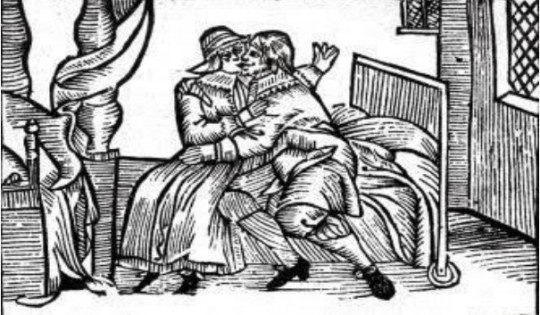
Seventeenth-century North American depiction of a fornicating Puritan couple
1680 – Legislators of New Hampshire pass the colony’s first capital laws, copied almost word for word from the Plymouth laws of 1671: If any man lie with mankind as he lies with a woman; both of them have committed abomination; They both shall surely be put to death: unless one party were forced, or were under fourteen years of age. And all other Sodomitical filthiness shall be severely punished according to the nature of it.

1822 – Rosa Bonheur, nee Marie-Rosalie Bonheur (d.1899), was a French painter, animalière and realist artist, one of few female sculptors. As a painter she became famous primarily for two chief works: Plowing in the Nivemais (in French Le labourage nivernais, le sombrage ), which was first exhibited at the Salon of 1848, and is now in the Musee d'Orsay in Paris depicts a team of oxen plowing a field while attended by peasants set against a vast pastoral landscape; and, The Horse Fair (in French Le marché aux chevaux ), which was exhibited at the Salon of 1853 (finished in 1855) and is now in the Metropolitan Museum of Art, in New York City.

Bonheur is widely considered to have been the most famous woman painter of the 19th century. Writers used to explain Bonheur's penchant for dressing in men's clothing by saying that the famous painter of animals needed disguises to paint unmolested in the markets she frequented for her subjects. It's a nice thought, but untrue. Rosa Bonheur, who lived together with Nathalie Micas for most of her life, dressed as a man because she wanted to. She drank, she smoked, she became one of the most popular painters in the world and a member of the French Legion of Honor. She was, in short, very much her own person. As she once said to a male friend who was concerned about her movement through the world of men (gasp!) unchaperoned, "Oh my dear Sir, if you knew how little I care for your sex, you wouldn't get any ideas in your head. The fact is, in the way of males, I only like the bulls I paint."

1937 – Today is the birthday of American pianist and composer David Del Tredici. Born in Cloverdale, California, he studied at Berkeley and Princeton.
Much of his early work consisted of elaborate vocal settings of James Joyce: I Hear an Army; Night Conjure-Verse; Syzygy; and a decade long obsession with the work of Lewis Carroll (Pop-Pourri, An Alice Symphony, Vintage Alice and Adventures Underground, and Final Alice, to name just a few of these works). He was awarded a Pulitzer prize in 1980 for In Memory of a Summer Day, the first part of Child Alice. Sir Georg Solti made the first recording of his epic Final Alice with the Chicago Symphony Orchestra.
Del Tredici detached himself from Carroll to write three large, dissonant works for orchestra, March to Tonality (1985), Tattoo (1986), and the threatening Steps (1990). However, the real turn in his career came in 1996, when he attended a workshop in gay sexuality and self-acceptance held by Body Electric, a national organization devoted to such workshops.
During that workshop, he set two overtly gay poems for voice and piano. This led to the composition of a number of songs based on gay texts and experiences. After attending that retreat for gay men, Del Tredici decided to integrate his sexuality into his work. For instance, a setting of Paul Monette's "Here" was dedicated to Del Tredici's lover Paul Arcomano, who died of AIDS in 1993. When he encountered Beat-era icon Allen Ginsberg at a conference, as he later related to The Advocate, Del Tredici told the poet, "I'm looking for something really dirty to set to music." Ginsberg responded by giving Del Tredici his Collected Poems, one of which, "Personal Ads," became part of a six-song cycle, Gay Life. "Personal Ads" was dedicated to gay activist Jody Dalton, director of Composers Recordings Inc.; and a setting of Thom Gunn's "Memory Unsettled" was dedicated to Del Tredici's mother, who died in 2000, and who had accepted her son's life choices. Gay Life also included poems from Paul Monette, Michael D. Calhoun, and W.H. Kidde.
These songs became the core of the cantata Gay Life (1996-2001, premiered by the San Francisco Symphony under Michael Tilson Thomas in May 2001). A related collection is Brother (1997-2001), a song cycle created with drag performance artist John Kelly, which premiered at P.S. 122 in New York in May 2001.
"I no longer want to pretend and I'm not sure what the repercussions might be," he told The Advocate. "I can survive and be a serious composer and be gay. It has fallen [to] me to do it. One generation's silence can become the next generation's nectar."
His later works have included many vocal settings of contemporary poets such as Allen Ginsberg, Thom Gunn, Paul Monette, James Broughton, Colette Inez, and Alfred Corn — often celebrating a gay sensibility (three examples: Gay Life, Love Addiction and Wondrous the Merge). OUT Magazine has twice named Del Tredici one of its people of the year.
His "On Wings of Song" was premiered in New York City in 2004 as part of the Riverside Opera Ensemble's 20th Anniversary Concert. His notable students include John Adams, Richard St. Clair and Tison Street.
Del Tredici met his life partner Ray Warman in 1999; the couple held their commitment ceremony in 2000.

Maccubbin (R) with partner Jim Bennett
1943 – Activist and former bookstore owner, Deacon Maccubbin was born on this day. Well-known as the founder and owner of Lambda Rising Books, Maccubbin has also been a supporter or founder of many gay Washington, DC institutions including youth outreach, media, the annual Pride celebrations, community social and business organizations, and the Lambda Literary Awards.
While still in the Army, Maccubbin became a gay activist, joining the Gay Liberation Front-DC briefly. In 1971, he took over a craftshop at 1724 20th St NW, turning it into the Earthworks tobacco and headshop. On June 8, 1974, Earthworks’ shelves of magazines and books became the core stock for the new Lambda Rising, one of the nation’s largest and most successful groups of gay bookstores.
As leader of the Community Building (a nickname from antiwar and counterculture days), Maccubbin turned the building into an incubator and haven for many new and struggling community groups, including the Gay Switchboard, gay youth groups, the Blade, off our backs, Roadwork, and many others.
Maccubbin was a founder and chair of the first major community group, the Washington Area Gay Community Council (WAGCC). In 1975 WAGCC launched the planning process for the second gay community center and published Just Us, the first guide to DC’s gay community. That same year, Maccubbin organized the first official Gay Pride, held on 20th St NW in front of the building.
In the 1973, he was arrested with Cade Ware and Bill Bricker from Gay Activists Alliance at a sit-in protesting police entrapment. His protests and civil disobedience continued during the 1980's in response to federal inaction on AIDS research and funding with an arrest at the White House, and in the 1990's in response to Clinton's signing the Defense of Marriage Act, as well as additional arrests at protests against apartheid at the South African Embassy and against the Pope at Catholic University.
Maccubbin has played important roles in the reform of D.C.'s sodomy law, passage of the D.C. Human Rights Act, and in responding to Bible-based attacks on homosexuality.
In 1982, he and his life partner, Jim Bennett, were among the first to celebrate a Holy Union and they were the second couple to be registered as Domestic Partners in the District of Columbia.
In 2003, Deacon saved the Oscar Wilde Bookshop in New York City (which had inspired him to launch Lambda Rising) from closing. Maccubbin commented, "The store never closed its doors. It was open right on through. Historically, that's important to me." In 2006, the bookstore was sold to a local manager.
Facing competition with online book stores, the store closed its doors on December 31, 2010. It was part of a spate of LGBT brick and mortar bookstores closures in the early 21st century, including the Oscar Wilde Bookshop in New York and A Different Light in Los Angeles and San Francisco.

1949 – Victor Garber is a Canadian film, stage and television actor and singer. Garber is known for playing Jesus in Godspell, John Wilkes Booth in Assassins, Jack Bristow in the television series Alias, Max in Lend Me a Tenor, Thomas Andrews in James Cameron's Titanic, and as Canadian ambassador to Iran, Ken Taylor, in Argo. He currently guest stars as Dr. Martin Stein on The Flash and stars as a regular on Legends of Tomorrow.
Born in London, Ontario, Garber is of Russian Jewish descent. His mother is Hope Garber, actress, singer, and the host of At Home with Hope Garber. He attended Ryerson Elementary School. He also was enrolled in the children's program of the Grand Theatre, and at age 16 he was accepted at a six-week summer theatre training program at the University of Toronto taught by Robert Gill.
Garber began acting at the age of nine, and studied at the University of Toronto's Hart House at age 16. In 1967, after a period working as a folk singer, he formed a folk band called The Sugar Shoppe with Peter Mann, Laurie Hood and Lee Harris. The group enjoyed moderate success, breaking into the Canadian top 40 with a version of Bobby Gimby's song "Canada" in 1967. The band even performed on The Ed Sullivan Show and The Tonight Show Starring Johnny Carson before breaking up.
He has worked in various American and Canadian films and television, including James Cameron's Titanic (1997), in which he used a Northern Irish accent to play the shipbuilder Thomas Andrews, and CTV's E.N.G. (1991-1993), on which he had a recurring guest role.
Other well-known appearances include Godspell (Canadian stage version, 1972, and film version, 1973) as Jesus, Sleepless in Seattle (1993), Annie (1999), Legally Blonde (2001), and Tuck Everlasting (2002).
He is most well known for his portrayal of Jack Bristow on ABC's show, Alias, for which he earned three Emmy nominations. He recently appeared on the now-canceled television series Justice on Fox and ABC's Eli Stone. His most recent TV appearance is as a mysterious character named "Olivier Roth" in 4 episodes of the Canadian science drama ReGenesis. He appeared in the third episode of the Fox series Glee as Will's father.

Rainer Andreesen and Victor Garber
Victor Garber has confirmed that he's a gay man and has been quietly living with his longtime partner, artist Rainer Andreesen, in New York. Garber first spoke of his relationship with Rainer to blogger Greg Hernandez, who pressed the actor to publicly confirm that he's gay after learning via Wikipedia that the 63-year-old star is partnered with a man. He asked the Garber if his partnership with Rainer had ever been made public, and noted that Garber seemed surprised by the question:
"I don't really talk about it but everybody knows," Garber told Hernandez before adding, "He's going to be out here with me for the SAG Awards." The handsome, happy couple have been together for 14 years.
On October 10, 2015, Andreesen announced on his instagram page that he and Garber were just married in Canada.

1976 – Matt Evers is an American pair skater, model and TV personality. He is the 1998 U.S. Junior champion.
With his partner Heather Allebach, Evers won the Junior pairs title at the 1998 U.S. Championships. The following season, they competed at three senior international events, 1998 Skate Canada International, 1998 Cup of Russia and 1998 Nebelhorn Trophy. He quit competing and moved to Los Angeles where he worked for a number of years before receiving an invitation to join Dancing on Ice.
Evers is currently training as a professional actor, model and spokesperson for U.S. and European manufacturers at trade shows, in commercials and print media.
Evers, who was married to a woman previously, came out as gay in January 2018 in an interview with Attitude magazine. He said it was partly the death of his uncle from AIDS and the presidency of Donald Trump that resulted in his decision to announce his sexuality publicly, saying: "I live my life by example, and I want to show young people that what you feel or how you were born isn't something bad."

1977 – Donal Óg Cusack is an Irish hurler who played as a goalkeeper for the Cork senior team. He is current Chairman of the Gaelic Players Association. (Hurling is a kind of cross between grass hockey and football.)
Born in Cloyne, County Cork, Cusack first excelled at hurling whilst at school. He arrived on the inter-county scene at the age of eighteen when he first linked up with the Cork minor team, before later lining out with the under-21 side. He made his senior debut in the 1996 Oireachtas Tournament. Cusack went on to play a key role for Cork, on and off the field, and has won three All-Ireland medals, five Munster medals and two All-Star awards. His brother, Conor Cusack, was an All-Ireland runner-up with Cork.
Cusack represented the Munster inter-provincial team on a number of occasions in the early part of his career, winning one Inter-provincial medal on the field of play in 2005. At club level he won one championship medal with divisional side Imokilly, while he also plays with Cloyne.
Cited by many as one of the most influential inter-county players of his generation, through his championing of the cause of player welfare with the Gaelic Players Association and his innovation as a goalkeeper, Cusack became the first openly gay elite Irish sportsman in 2009.

Cusack and team-mates in traditional salutory (and very homo-erotic) stance.
Cusack has made 54 championship appearances for Cork, more than any other goalkeeper in the county's history. He announced his retirement from inter-county hurling in March 2013 after effectively being dropped from the team.
On 18 October 2009, ahead of the release of his autobiography, Come What May, Cusack disclosed to the Irish Mail on Sunday that he is gay. In Come What May he writes:
I get more out of men. Always have. I know I am different but just in this way. Whatever you may feel about me or who I am, I've always been at peace with it.
The following was serialised in the Mail on Sunday:
Since I was 13 or 14, I knew I was a bit different. I hate labels though. That's the way I am. I live with it and I am fine with it. People close to me will tell you there were never any tears. There was never agony. I just know this thing … I've had to say this to people I'm close to again and again. This is who I am. This is what I do. I spend a lot of time trying to work things out but once I know something about myself, I know it. I don't agonise. It's logical to me. I thought about this but never had any problems dealing with it.
According to Cusack, discussing his sexual orientation strengthened his bond with his fellow players. He went for a walk with then captain Seán Óg Ó hAilpín, whom Cusack had known since they were boys, and told him "the whole story, stuff that I thought he would have guessed", had "a deep and complex conversation from both sides and we came out of it like brothers."
Since then Cusack has been noted as one of the few "openly gay sporting heroes" both at home and abroad. Come What May won the William Hill Irish Sports Book of the Year for 2009

1987 – A Louisiana appellate court upholds the solicitation conviction of a man for placing his finger through a glory hole in a bookstore and then placing his mouth at the hole, without saying a word.
1998 – Pope John Paul II asks God for forgiveness for the inactivity and silence of some Roman Catholics during the Holocaust.

13 notes
·
View notes
Text
Retro-futuristic espionage, a love letter to the vintage, and living music: JAZZPUNK
It's almost impossible not to find something new every time you replay Jazzpunk. Saxophonist pies, corporate espionage, comedy and cybercrime: few videogames—if there's more than just one—gather these characteristics and make them dance in a way as harmonious as it does. This adventure game transports whoever touches it to the late 1950s during an alternate Cold War, where the north of America has become the United Prefectures of Japanada and robots are a common sight on Earth.
Its developers, Luis Hernandez and Jess Brouse, initially released the game in 2014 with a total of 10 chapters. Posterior to that, in 2016, they released another edition of the game, both for PC and PlayStation 4 consoles, with content never seen before. While it didn't add more chapters to the game, it did add a DLC 'level' and amplified the preexisting ones.
The mute protagonist of this exhilarating experience, Polyblank, serves as a vessel for the player to be transported to this strange world. His adventure begins in an abandoned subway station where he meets with his coworker, Secretary IX; and boss, The Director. The latter assigns him missions, like infiltrating the Soviet Consulate, extracting a bio-engineer cowboy's artificial kidney, going on vacation and fighting against his nemesis, The Editor.
It's only to be expected that in each of these sections you can find side quests—I mean, would it really be as good a game if you couldn't eat a pigeon or travel in space and time?—. Though, different to other games, these are made to distract the player from the main task at hand and force it to explore the (almost) open world. There's no logic games, or puzzles, but there are weird gadgets and exotic stores that, without any doubt, make whoever sees them stop for a moment to laugh at them.
It's a game plagued with references to its epoch, as can be appreciated in its art and the architectonic style of its scenes, perfectly fit for vintage enthusiasts; though it is also full of references to the 21st century's earliest years, like its videogame scene and popular culture.
Leaving this aside, there's another crucial aspect that would be a crime not to point to: its music. If the Jazzpunk soundtrack could be described as anything, it would be a loving fusion of the two eras mentioned earlier. Luis Hernandez, one of its developers, gave himself the task to create it. He used old tape recorders and analogic homemade synthesizers; not using a computer for anything but to introduce the music into the game. It's loud, out of tune and, instead of following the player, it's stuck to objects. It perfectly complements the vibrant graphics and makes the wacky world you find it in alive and tangible.
Nowadays, almost three years of knowing Jazzpunk, I'm still surprised by tiny details I hadn't seen before (and that's considering I always think that then, finally, I'll have seen it all). If you are looking to spend a good three hours��or more, if that's how bored you are—; the comical plot, interesting references and peculiar soundtrack of this game might be your solution.
14 notes
·
View notes
Text
marauders era mbti headcanons: the valkyries (except that it’s based off of my view of the characters)
lily evans: enfj-t (the protagonist — inspiring optimists, readily taking action to do what they feel is right. thoughtful and idealistic, strive to have a positive impact on the world around them. don’t shy away from the opportunity to do the right thing, even when the t is far from easy.)
marlene mckinnon: estp-a (the entrepreneur — savvy, energetic, and perceptive people who truly enjoy living on the edge. have an impact on their immediate surroundings; spot them at a party by looking for the whirling eddy of people flitting about them as they move from group to group)
mary macdonald: esfj-a (the consul — caring, social, community-minded people who are always eager to help. life is sweetest when it’s shared with others. form the bedrock of many communities, opening their homes and their hearts to friends, loved ones, and neighbors.)
dorcas meadowes: intj-a (the architect — imaginative and strategic thinkers. rational and quick-witted, pride themselves on their ability to think for themselves, not to mention their uncanny knack for seeing right through phoniness and hypocrisy.)
#it seems like we have got some twinsies (james and mary and dorcas and sirius)#which tbh was to be expected since i hc these charactersto be quite alike#anyways!!!#lily evans#marlene mckinnon#mary macdonald#dorcas meadowes
33 notes
·
View notes
Text

Napoleon is so baby in this one
Jean-Baptiste Greuze, painting c. 1803
(The year before he became emperor btw)
#Bonaparte premier Consul#Napoléon Bonaparte Premier Consul représenté devant une vue de la ville d'Anvers en 1803#Jean-Baptiste Greuze#Greuze#napoleonic era#napoleonic#first french empire#napoleon#19th century#napoleon bonaparte#french empire#france#history#art#painting#rococo#classical#neoclassicism#neoclassical#paintings#portraits
35 notes
·
View notes
Text
For Les Mis Letters context: A quick timeline of French history from the Revolution to 1806, when Myriel becomes the Bishop of Digne:
(I'm marking all the years just to make it easier to visually follow the timeline, but I'm only noting a few events that I think are relevant. Too much happens in this era to list it all.)
THE TIMELINE:
1789: Estates General, the storming of the Bastille (14 July), the National Assembly -> the National Constituent Assembly, abolition of feudal privileges
1790
1791: Constitution of 1791, the Legislative Assembly, France becomes a constitutional monarchy, the Haitian Revolution begins
1792: The Revolutionary Wars begin; the "miraclous" French victory at Valmy, France is declared republic, the National Convention replaces the Legislative Assembly, the Republican Calendar established, etc.
1793: Louis XVI and Marie-Antoinette executed, the counter-revolutionary uprising in the Vendée begins, Constitution of year I, Reign of Terror begins
1794: Reign of Terror ends
1795: Constitution of year III, the more conservative Directory replaces the National Convention, First White Terror
1796: The War in the Vendée ends
1797
1798
1799: Napoleon Bonaparte's coup d'état (18 Brumaire); the Consulate replaces the Directory, Bonaparte becomes First Consul
1800
1801
1802: Bonaparte First Consul for life, the Revolutionary Wars end*
1803: The Napoleonic Wars begin*
1804: Napoleon declares himself emperor (and Myriel has a little chat with him), the Napoleonic Code
1805: Great French victory in Austerlitz against the Russo-Austrian forces, decisive British naval victory against the French in Trafalgar, Republican Calendar abolished
1806: Decisive French victory in Jena against the Prussians (Myriel becomes the Bishop of Digne)
NOTES:
Don’t worry, I won’t list any more specific battles, aside from Waterloo.
Valmy was the first victory of the French Revolutionary army, which proved that French volunteers could match against professional soldiers, Austerlitz is the big one for Napoleon, Trafalgar is the big one for the British, Jena is another big one for Napoleon, and finally Waterloo will of course end it all once we get there.
The only reason I’m even bringing up this many battles is because Hugo is a Napoleon nerd, so unfortunately you will have to hear about them (and many more) sooner or later anyway. (Also I added Valmy just for myself, Hugo only mentions it once in Les Mis)
* I'm not bothering to mark all the different wars; France was almost continuously at war from the 1792 to 1815 (the entire period of the First Republic plus the entire period of the First Empire) with only a few short breaks. People can't even agree on when the Revolutionary Wars turn into the Napoleonic Wars.
I also left out all the constitutions after year III, because there are too many of them and nobody cares.
#les mis letters#i was a bit hesitant to post this#because it seems like such a boring post to make tbh#but whatever yall can skip it if it's boring#long post#sorry#corrections v much welcome btw#im not a frev expert#there are also so many more things i wanted to include but decided not to
88 notes
·
View notes
Text
Today I decided it will be a good day to talk about a private RP project I’m a part of in one secret TMA server which I share with @the-symphony-of-lydia-brown, @envisionedeternity and @thistlesandstories from our irl friend group and @mersilisk as the guest star and amazing antagonist.
I don’t post much and especially not for The Magnus Archives but I admit the podcast is very important to me. My favourite thing about it is the Regency Harem™️ and the historical episodes. Intertwining the lore with the actual historical events and characters is just amazing.
My irl friends know that I have certain level of interest in military history, and therefore I decided to make a use of it and suggested a plot line for a private RP - a short prequel story for Robert Smirke and young Jonah Magnus meeting. Also, we wanted a Slaughter story because there’s way too little of those in the podcast.
And the background is… The Napoleonic Wars. My beloved @thistlesandstories is a reenactor from that era and therefore they got very excited about the project. The excitement grew contagious and turned @the-symphony-of-lydia-brown into a proper horror DM.
The plot line so far:
Europe, 1811. Napoléon Bonaparte decided to be the problem. Given his notable military accomplishments, the Slaughter just couldn’t leave him unnoticed. After all, the concept of the Total War is born. One day, the Slaughter had came to the young Napoléon and offered him that he would become the greatest warrior of all time. The First Consul of France has agreed.
The Slaughter is rising, therefore it is convinced that the time has come to attempt a ritual. But for a war ritual you sorta need to have two sides, right. There are plenty of “other sides” - and there is one talented general, very dedicated to defending his country. Honourable and skilled man - Viscount Arthur Wellesley, soon to be the Duke of Wellington. Wellington was not having a great time in the Portuguese campaign as his forces were being pushed out by the French, when the Slaughter called to him - offering a victory in exchange for his service. Wellington considered, out of loyalty, he agreed with the nightmarish pact.
The situation improved as now the British and Portuguese army set up an attrition trap with the French falling in. Then guess what - the Slaughter calls again. (The attrition war is usually not exactly Slaughter aligned thing. The soldiers die of starvation, freezing, sickness, which is inherently a corruption thing - The Slaughter wants the bloodbath). Now, the Slaughter has called for a French man again - Marshal Michel Ney, said the Bravest of the Brave, known for his extremely risky approach to the war. An ideal candidate, so it seems . When the French finally retreated and Ney successfully bought their exhausted troops some time by his rearguard actions, the Piper showed up to him, offering him the victory. However, the French marshal has none of that shit and literally tells the War itself to shut the f**k up. Obviously, the Slaughter hates him now.
But now it’s May 1811. Now, time for some historical liberties, yay! Ney lost his command after he disrespected his commanding officer, and his wife convinced him to take a break - therefore they ended up chilling in a little German spa town with their children. The resort happens to be the favourite place of one of the Würtemberger aristocrat Albrecht von Closen. This young man decided it would be nice to invite his British friend Jonah Magnus.
Jonah is very young, he just turned 18, he inherited notable amount of money from his deceased uncle and he has many admirers for his intellect and general charms. However, even now, Jonah is more of a cold academic, a silent observer, with little interest in changing the world. He only wants to know and to understand. And he is just as cold to his companion, sir Barnabas Bennet, who is not really financially stable, but somehow he managed to incite himself to go with Jonah. Barnabas is like a pure opposite of Jonah - hot headed, adventurous and painfully irresponsible.
The last guest to arrive is… nobody else than Viscount Wellesley himself. He has earned a short period of leave and he just picked the same recreational spot as his enemy, Ney. It’s not a coincidence however, the Slaughter is still feeling petty and it wants to ruin Ney for his insolence. The future victor of Waterloo seems to be a good tool for ruining the Marshal’s involuntary holiday.
Oh well. He might not be the last to arrive. There is one more man, who will go down the TMA history - a certain gifted character in his early thirties, working hard on something barely connected to the architecture. Maybe it has something to do with his paranormal obsession. Ladies and gentlemen, welcome sir Robert Smirke!
So yes. The scene is all set. So far it goes very well. Except… it is not.
The disasters are here!
Jonah Magnus seems more interested in Wellesley than in his travel mate Barnabas. Out of desperation, Barnabas decides to finally confess his feelings for Jonah. It went well in his head. He approached the armchair in the lounge, seeing those rich copper curls. He took a deep breath and finally kissed him… Only to realise that Jonah Magnus is not the only one to sport this hairstyle. Red-haired marshal Ney is not amused and his first instinct was hitting the perpetrator right in the face and showering him with list of French profanities.
Albrecht von Closen has really bad feeling about Arthur Wellesley. He is himself a very sensitive and observant man and he disapproves of Jonah’s interest in the famous British commander. It is not the first gut feeling of this kind Albrecht had and he is not exactly sure what to do with that. He meets an unlikely ally - very angry Marshal Ney who is certainly not happy about Wellesley’s presence either.
Robert Smirke found what he was looking for- the presumed Slaughter avatar, aka the Napoleon’s bravest Marshal (please consider that Smirke is a Brit and therefore the idea of future Duke of Wellington as the avatar of the Slaughter is just unimaginable to him). The architect is not exactly a good candidate for a spy and therefore he gets noticed by Ney’s children who decide to take the situation in their hands and reveal the man who keeps stalking their father.
This happened so far. But the plot shall go on because… Enter The Stranger!
The Stranger is still obviously pissed after the Slaughter’s agents ruined their ritual in 1787. So it wants a revenge. And the ideal idea of their revenge is taking the Slaughter avatars one by one and turning them into waxworks. And obviously, their victim is the Napoleons’s marshal Ney.
Jonah Magnus is getting bored of relaxing and he is ready to meet a new friend: the famous Robert Smirke. The man, who will unknowingly bring the Apocalypse two centuries later.
The reasons for posting this is the following:
It’s 255th birthday of Michel Ney! He was originally meant to be a background character, but he sort of stole the show. I might or might not be responsible since I’m the one playing the gingers.
Also, this post might or might not work as a peer pressure for @the-symphony-of-lydia-brown to turn it into a fic 👀
The special acknowledgment goes to @thistlesandstories because we have discovered that somehow we really enjoy fighting with each other after six years of being together. The prequel for Ney and Wellington in Portugal was the best part of this year’s Christmas. I’m still crying for the French officer taken by the Piper though I also love the amount of research it goes into this activity. We ended up with new books on Ney and Wellington.
Credits:
Albrecht von Closen, Aloys Ney: @the-symphony-of-lydia-brown
Robert Smirke: @envisionedeternity
Arthur Wellesley, Barnabas Bennett, Eugène Ney: @thistlesandstories
The Stranger Danger, Léon Ney: @mersilisk
Jonah Magnus, Michel Ney: Me, because I’m all the gingers
#the magnus archives#tma fic#tma rp#tma jonah magnus#barnabas bennett#robert smirke#regency harem#napoleonic era#Napoleonic fiction#arthur wellesley#michel ney
17 notes
·
View notes
Text
The Early Roman Republics, According to Harriet Flower
In Roman Republics, Harriet Flower proposes a model of Roman history characterized by a series of "republics," not just one continuous government. Let's see how she carves the timeline up, and why:
~509-450: A transitional period and proto-republic
450-367: 1st republic, dominated by patricians and consular tribunes
366-300: 2nd republic, characterized by shared power between patricians and plebeians
(I'll handle the later periods in a separate post - I'm posting my notes as I read each chapter.)
Flower readily acknowledges that this division is just as artificial as the "one 450-year republic" model, but believes this portrays Roman government as more dynamic and evolving than it's usually credited for.
The Proto-Republic, 509-450 BCE
When Flower speaks of a "republic," she isn't merely referring to any government without a monarchy. She defines it as a res publica, a "public thing," and therefore a government representative of the public, and which operates in public, according to established norms or laws. A large enough change in a state's constitution in a short timespan may count as a new "republic" here.
So by Flower's definition, Rome didn't automatically become a republic right after its last king was kicked out; she considers it a transitional period until the Twelve Tables publicly codified Roman law in 450 BCE.
We know little about how Rome's government worked during this time. Traditionally, it's said that only patricians could hold public office, but Flower points out that the consular fasti list plebeian names from this time period, too. We aren't even sure if there were consuls regularly or if some of these are later interpolations. Livy alludes to a mysterious "praetor maximus," and there seems to have been a lot of conflict. A greater role was also given to various curia, which seem to have been assemblies based on kinship group. The tribunes of the plebs appear to date from this time, but we don't know how much power they had.
The Patrician Republic, 450-367 BCE
From the Twelve Tables onward, we can assume Roman law had some sort of structure, and presumably so did its government. But a lot still varied from year to year.
Plebeian names are rarer on the fasti in this period, hinting that perhaps the patricians did take control of political offices for a while. This republic may have allocated power based on heredity rather than merit.
In some years, we see consuls recorded, but in others, there are "consular tribunes." Flower says they seem to have governed as groups of up to eight men. Unlike consuls, consular tribunes did not celebrate triumphs, and their authority was not sanctioned by religious auspices. This "rule by groups" appears to have been mostly or exclusively patrician, and contrasts sharply with the hierarchy of magistrates in later eras. It became more common toward the end of the first republic before consular tribunes were abolished in 367.
Flower speculates that this first republic may have been mostly a creation of the patricians, since they seem to have dominated political offices more than in the previous period. But that doesn't mean plebeians were entirely excluded. They may have had their own assemblies and officials, and the consular tribunes as a group may have been a patrician response to the plebeian tribunes, who were elected as a group each year as well.
But whatever it was, something exploded in the years up to 367, leading to...
The Joint Republic, 367-300
No more consular tribunes! Only consuls in charge now! Well, actually they added a praetor (just one at first) and censors, too. Plebeians gained access to formerly patrician offices, and a new combined aristocracy emerged out of the patricians and wealthy plebeians.
Flower points out some familiar themes in Roman legislation around this time, such as colonization projects and debt relief. Rome expanded considerably in this period, which Flower suggests may be due to increasing competition among the expanding aristocracy. A greater emphasis was placed on personal achievement and wealth to gain access to power, though hereditary prestige never truly disappeared.
Flower dates the end of this period to 300, when major priesthoods were opened to plebeians, but says that one could also place it at 287, when legislation of the Plebeian Assembly became binding for all citizens.
A Historiographical Note
I'm simplifying much of Flower's first two chapters here, and every preceding paragraph should be accompanied by a big old "We don't know for sure," as she repeatedly reminds us. The earliest written Roman history came from Fabius Pictor, who published around 215-200 BCE. Fabius was himself a patrician and politician, and that likely shaped how he understood and described the past. He would not have had access to detailed accounts from before 300 or so.
Arguing over whether there was one republic or several is less about specific facts, and more about the story we derive from the facts. Do we think of the Roman republic(s) as mostly stable, up until things start "going wrong" after 133 BCE? How extensive was the conflict between patricians and plebeians - and how much is distortion from later aristocrats trying to make their families look good? What counts as the "end of an era," and why?
I don't know, and I'm only 30% through the book so far, so I haven't made up my mind. I should probably pull out SPQR after this and compare Flower's model of the republic's evolution to Mary Beard's. And Gruen's Last Generation of the Roman Republic, which has a very different take on the 50s-70s than Flower does.
12 notes
·
View notes